The 2019 International Symposium on Tropical Fruits (ISTF 2019) was held at the Liberty Central Saigon Riverside Hotel, Ho Chi Minh City, Vietnam on 24-26 September, organized by the International Tropical Fruits Network (TFNet) and the Ministry of Agriculture and Rural Development (MARD) with the support of the Fruit and Vegetable Research Institute (FAVRI) and the Southern Horticultural Research Institute (SOFRI).
Bearing the theme “Recent advances and best practices to improve productivity and enhance market access for tropical fruits,” ISTF 2019 discussed the latest scientific research, technology developments, and product innovations. Moreover, the Symposium tackled how latest research can translate into practical solutions encompassing improvement of market access especially for smallholders, increasing marketing opportunities, development of supportive policies, and other economic improvements.
Eighty participants from 11 countries attended the symposium, including Australia, China, Fiji, Germany, Indonesia, India, Malaysia, Philippines, Sri Lanka, Thailand, and Vietnam. Participants represented various stakeholders such as smallholder farmers, international organizations, government agencies, academic and research institutions, fruit experts, and the private sector.
Twenty-five oral presentations were delivered during the two-day symposium while nine poster presentations were displayed in the exhibition area. Presentations fell under the following themes: 1) Focus and policies on tropical fruit development; 2) Biotechnology and breeding; 3) Pests and diseases management; 4) Farm practices and recent developments to improve productivity; and 5) Markets and trade.
Opening Ceremony
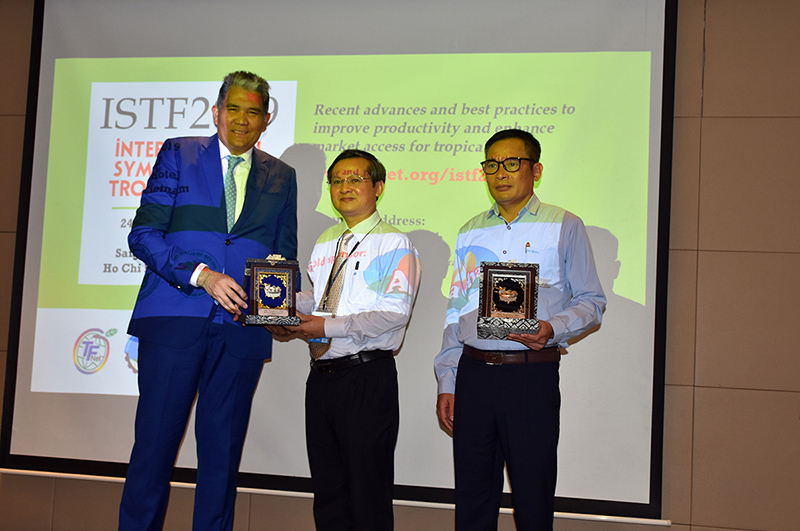
Acting General Director of Crop Production, Department of Agriculture Vietnam who delivered the opening address on behalf of Le Quoc Doanh, Vice Minister of MARD Vietnam provided insights into the relevance and importance of agriculture in the context of Vietnam.
“We are very grateful to TFNet for choosing Vietnam to host this significant symposium,” said Nguyen. “With the focus on recent advances and best practices towards improving productivity and enhancing market access, the theme of ISTF 2019 is very relevant to identify and address the existing knowledge and technological gaps prevalent within the tropical fruit sector.”
Agriculture 4.0 in tropical fruit production
“Despite the global economic slowdown, production of tropical fruits continues to increase around the world – in tandem with the growing demand and population growth,” said Mohd Sallehhuddin Hassan, Secretary General of the Ministry of Agriculture and Agro-based Industry Malaysia and Chairman of TFNet in his welcome address.
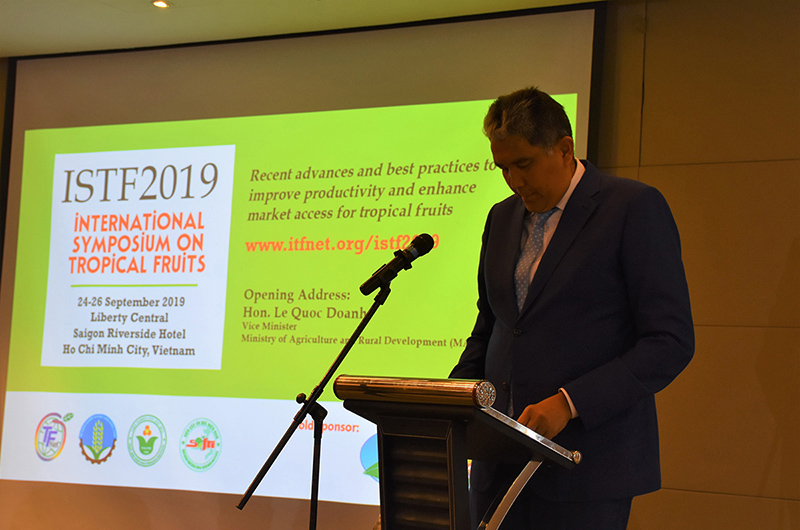
Sallehhuddin highlighted the transitions taking place in the operations of global trade and businesses which are beginning to embrace the technologies and innovations brought upon by the Fourth Industrial Revolution (IR 4.0), and called the tropical fruit industry to consider the demands of the modern day consumer base for authenticity, transparency, and traceability.
Dubbed as Agriculture 4.0, this movement focuses on precision agriculture, the internet of things (IoT) and the use of big data to produce more efficiently in the face of rising populations and climate change.
This call was further reinforced by the keynote presentation delivered by Sabine Altendorf, economist from the Food and Agriculture Organization of the United Nations (FAO), through her presentation “The Outlook of the Global Tropical Fruit Industry: Current and Future Trends.”
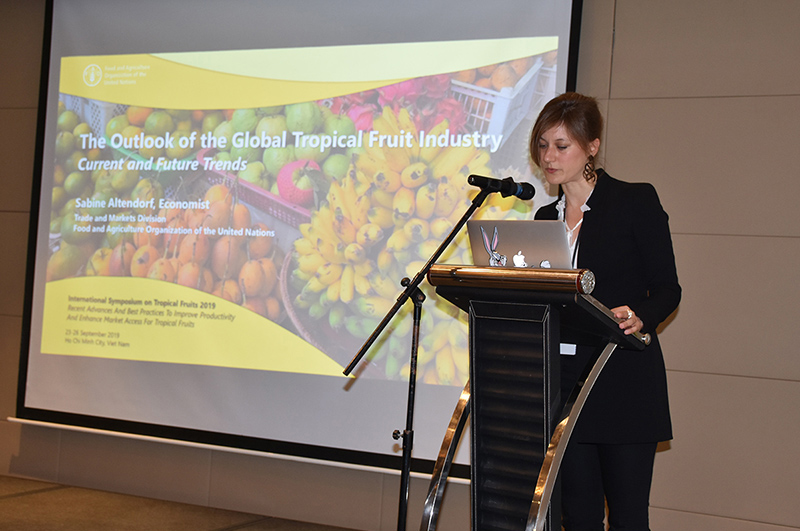
Precision farming, also known as site-specific crop management, measures and manages variables such as water, soil, pests, and yield to the farmer’s planting area. Meanwhile, nanotechnology applies nano-particle biosensors to deliver nano-encapsulated fertilizers, herbicides, and pesticides in the required dosage at the right time. Finally, growing in greenhouses allows farmers to control the environment to cater to the specific needs of the plant, regardless of the external climatic conditions.
Altendorf recommends the development of supportive policy frameworks to cater to the technical, institutional, infrastructural, and capacity development demands of new technologies. Improving the digital infrastructure also goes hand in hand with capacity development for smallholder farmers. Development of such policies should be inclusive to ensure smallholders are not left behind in participating effectively in changing business models.
Traceability and the supply chain
These thoughts were further resonated by the second keynote presenter Steve Nguyen Duc Phuong Nam, Managing Director of WOWTRACE who provided a comprehensive overview on the role of blockchain technology in agricultural innovation.
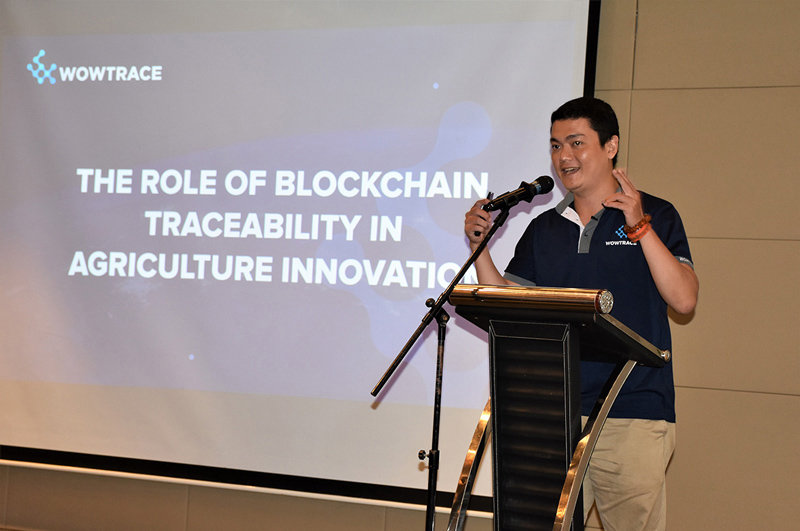
Tropical fruits, like other agricultural produce, undergo a complex journey before reaching the market. This journey, called a supply chain, comprises of all the actors, processes, and steps involved in bringing food from farm to table.
With the internet age, consumers have become more discerning about the safety and quality of food consumed, simultaneously being concerned about issues such as food safety, organic certification, food quality, and fair trade. Distributed ledger technology (DLT) allows consumers to trace the product’s journey along the supply chain. Food traceability increases trust in the quality of products and is an opportunity to reward the producers who employ good agricultural practices to cultivate their produce.
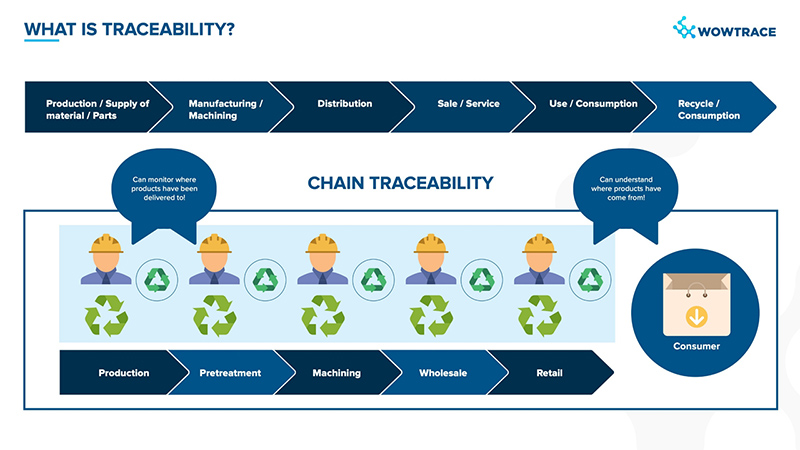
DLT is a decentralized system for recording transactions with mechanisms for processing, validating and authorizing transactions that are then recorded on an immutable ledger. Blockchain is an implementation of DLT, consisting of a linked chain that stores auditable data in units called blocks.
For agriculture, each block can contain valuable information about each step along the supply chain: such as the location of the farm, certification status of farm, location of harvest, point of shipment, and time of arrival at the market.
Traceability along the supply chain can save costs by increasing efficiency, providing on-time and immutable data, efficiently managing product recalls, providing and verifying product certification, reducing waste, and providing transparency for consumers.
Moving forward
To conclude, a panel discussion on “The road to Tropical Fruits 4.0. Is it a reality?” was held. The panel experts were Sabine Altendorf, Economist from FAO, Rome; I Made Supartha Utama, Professor from the Udayana University, Indonesia; Rajbir Singh Panwar, Joint Secretary of the Department of Agriculture, Cooperation, and Farmers Welfare (Ministry of Agriculture and Farmer’s Welfare, India); and Manoj Nardeosingh, Secretary General of the African-Asian Rural Development Organization.
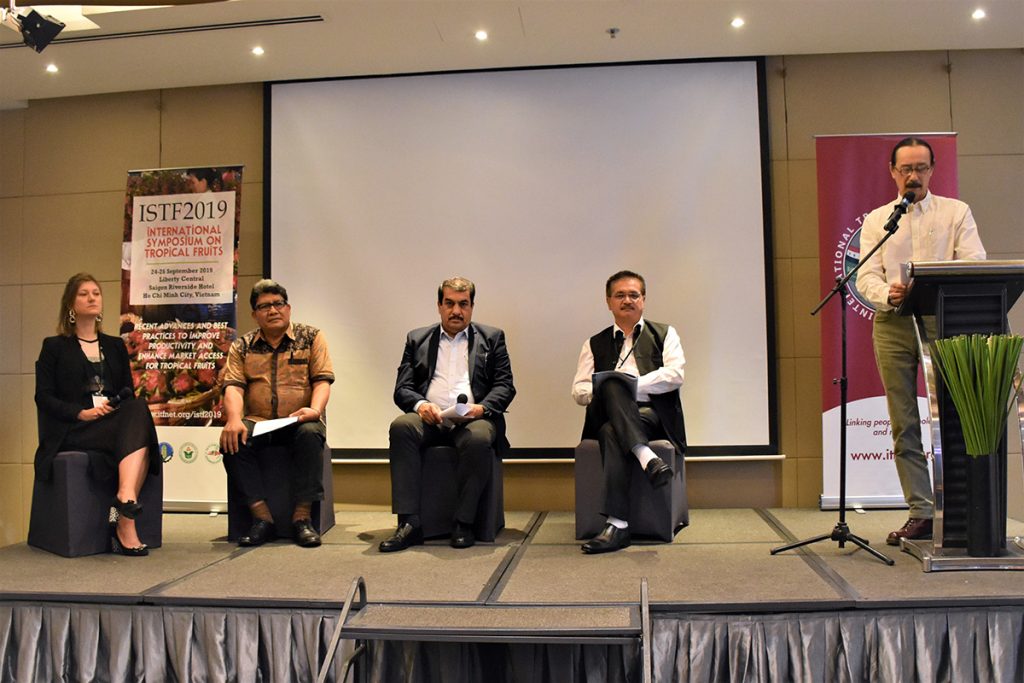
It was moderated by Yacob Ahmad, Adviser and Board Member of TFNet. The panelists discussed at great length on the viability of proposed technologies and the present readiness of the tropical fruit industry towards adapting to the disruptions created by the onset of IR 4.0.
Despite the immediate barriers faced by industry players include the high-costs related to the adoption of IR 4.0 technologies, Tropical Fruit 4.0 was unanimously agreed to be a viable solution in paving the way for improving the production of tropical fruits to meet the growing demand for the commodity. However consideration should be given to the importance of accessing these technologies at a more cost-effective manner. This is largely attributed to the fact that most producers of tropical fruits constitute of resource-poor smallholders.
The success of Tropical Fruits 4.0 can only be possible if an inclusive and supportive policy framework is established to boost the uptake and adoption of relevant IR 4.0 technologies for sustaining the tropical fruits industry.
For more information about ISTF 2019, visit the website here. More photos of the Symposium can be found here. Photos from the field trip can be found here.

